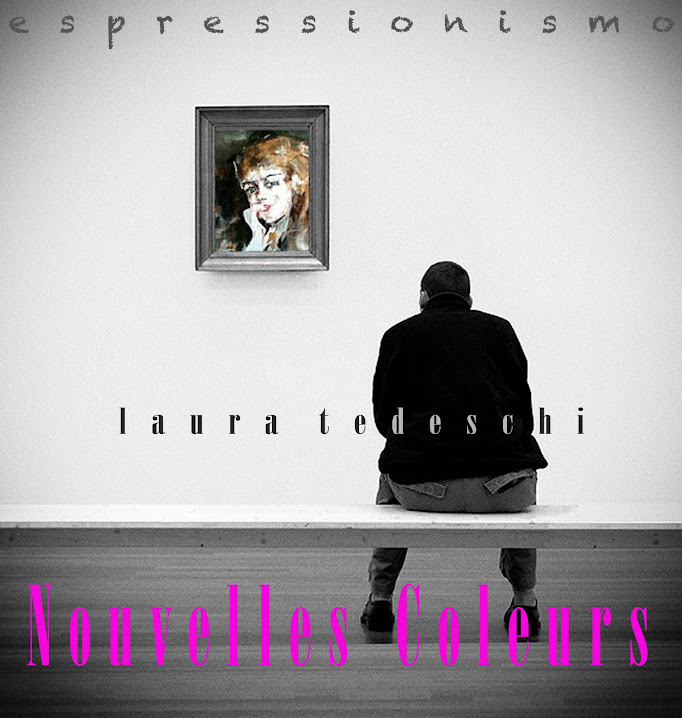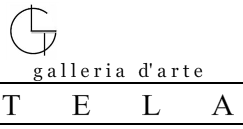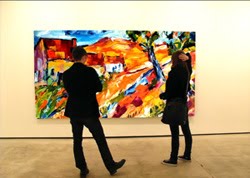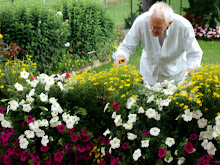Hamlet is looking in the mirror placed in front of him, move by a sense of corruption that pervades him, asking himself the meaning of his life, but behind that mirror there is the other, that uncle who killed his father, which is the origin of his sense of corruption.
Behind the mirror, the unconscious, there are pictures of that "other" than the ego don't not know, his shadow. Here the mirror is the membrane dividing what is consciousness and what is there instead unconscious. So, as in Alice in Wonderland or Alice behind the mirror, things in the other part, are different, transformed, opposed to those who we recognize in consciousness.
It's with this opposite that Hamlet must draw conclusions, unmask the sense of the arcane made of passion, love, revenge, justice, disappointment, sense of corruption, loss of innocence. But he can't get out of the maze made up of diverse and conflicting feelings. At some point in the scene, we see expressed succinctly, the nature of the paradox in which Hamlet is immersed. First he says to Ophelia: "... I loved you ..." and then says "... I've never loved ..."
The young Prince feels with himself, that he can not evade the sense of corruption spreading into his soul. This is the tragedy of Hamlet: the loss of innocence under the pressure of a strong and terrible pain experienced as something unfair.
Foto di Laura Tedeschi
Amleto è di fronte allo specchio, vale a dire di fronte a se stesso chiedendosi il senso della sua vita, spinto proprio da quel senso di corruzione da cui si sente pervadere, ma dietro a quello specchio c’è l’altro, quello zio che ne ha ucciso il padre e che rappresenta l’origine di ogni suo senso di corruzione. Dietro allo specchio, nell’inconscio, ci sono le immagini di quel altro rispetto all’Io di cui l’Io non sa, cioè la sua ombra. Qui lo specchio rappresenta la membrana che divede ciò che c’è nella coscienza e ciò che c'éinvece nell’inconscio. Come in Alice nel paese della meraviglie o Alice dietro lo specchio, le cose, in quell’altra parte, sono diverse, trasformate, opposte a quelle che riconosciamo nella coscienza. E’ con quell' opposto che Amleto deva fare i conti, smascherare il senso dell’arcano fatto di passione, amore, vendetta, giustizia, delusione, senso di corruzione, perdita dell’innocenza. Ma egli non riesce ad uscire dal labirinto composto di sentimenti contrapposti e variegati. Ad un certo punto nella scena vediamo espresso sinteticamente la natura del paradosso in cui si trova immerso Amleto, da una parte dice ad Ofelia: “…ti ho amata…” o poi dice “…non ti ho mai amata…” Il giovane Principe sente dentro di sé che non riesce ad affrancarsi da quel senso di corruzione che lo pervade e sta dilagando dentro la sua anima. Questo è il dramma di Amleto: la perdita dell’innocenza sotto la spinta forte e terribile del dolore, quando il dolore è vissuto come qualcosa di ingiusto. Infatti il dramma inizia con questo senso di profonda ingiustizia.
Tuesday, 15 June 2010
Subscribe to:
Post Comments (Atom)

















+8.jpg)



25 comments:
Importante la riflessione che ci offri, Laura, ogni persona ha a che fare con lo specchio, ciascuno di noi si porta dentro incertezze e sofferenze. A volte sentiamo quasi con rabbia che queste sofferenze sono ingiuste. Ma un passo + in là possiamo invece capire che se nella nostra vita mancasse la sofferenza forse non potremmo imparare a crescere. Ma di certo non siamo stati creati per soffrire, anzi, la passione che ci connota e il profondo desiderio di realizzare pienamente noi stessi sono indici di felicità possibile. Crediamoci! Un abbraccio.
Luigi
hai perfettamente ragione Luigi,
io ci credo sempre :-)
un abbraccio e un saluto alla nostra bella terra veneta ...
Liebe Laura,
das ist wundervoll geschrieben, mit diesem Durchblick in den Spiegel hinein...
Du bist eine gaaaanz Süße und Schmucke, lächel..
herzlichst, Rachel
Rachel
:-) danke Rachel
Laura, thank you. Now you have me thinking: what if we were to trade places with our reflection for a day?
William Michaelian
william is a good question, you're too strong.
I think that happens to someone, even to me, and I think perhaps this is the reason of shyness and fear of being judged for what we not are
Eso es grande. Un bello ejercicio diario.
Y la foto...que brillo!
Un besito, bonita!
Crissant
gracias querida
Laura !!!
what a fantastic image !
i think it is the first time i see your face , i knew , i cound feel you were pretty , but din't know that you are SO pretty .
and this text .... very touching , so true .
thank you for this post .
the post by itself is a piece of art .
"the loss of innocence under the pressure of a strong and terrible pain experienced as something unfair"
This is a metaphor for everybody, skillful
pinnacled for us by Master Shakespeare,
everybody is Hamlet!!!
Under changed circumstances Hamlets Idea of Love has changed too, in fact he realized it was just another Projection.
The point is maybe after realize what hamlet realized to not wallow in self-pity...
I opt for curse this world, because of its Nature and a healthy portion of self-irony :-)
La sofferenza aiuta a crescere...
Perfecto
Un beso
Não sabe Alice que atrás do espelho, existe apenas o papelão?
Hamlet, por certo, sabia bem...
...e Ophelia, a mais desavisada, existiu apenas como ato da fala do príncipe melancólico, esvaziando-se de todo à medida que este retrocede na afirmação de seu amor.
Alice é metáfora do tempo. Hamlet, constatação da insustentabilidade desse mesmo tempo que em Alice metamorfoseia-se.
(Há um Hamlet, uma Alice e uma Ofélia no meu espelho também).
Idea meravigliosa, profondamente riflessivo il parallelismo tra Amleto e Alice...
Grazie per il commento, felice per la visita al mio blog.
Bacio, Laura.
anche se riflesso il tuo sguardo e' penetrante
mi sentirei messo a nudo
anima e corpo
ma nello stesso tempo ha dell'ironico, del vissuto
ciao
Michele pianetatempolibero
Il fascino di riflessione, così diverso da ciò che percepiamo dal di dentro la pelle.
Saluti
Laura, you are beautiful. You have a look of 1930's gorgeous in this photo. Your words remind me of absolute frustration of living a paradox. Tragedy says it all.
Caio Fernandes
Meu caro amigo, estou feliz que você gosta de esta foto. :-) Agradeço os elogios, talvez es uma forma uma forma de auto-promover el proprio ego heheheh, as vezes sinto la necessidade de auto-promoverme ...
gostaria muito de ser capaz de fotografar ...
gracias, besito
Dazpo
"The point is maybe after realize what hamlet realized to not wallow in self-pity"
oh you are hier so much right!!
and your I think your opt is the right one, even is not always simple...
thank you sincerly for comming :-)
stella
ciao Stella, certo é verissimo
carlos guerrero
gracias Carlos :-)
Ângela Calou
você está certo (you are right!), mea cara amiga,
um grande beijo e obrigado pela visita, estou sempre feliz em vêrte
Michele
Ciao Michele, beh é un bel compliemto, grazie
Xibeliuss
hai colto in pieno l'argomento,
grazie mille della visita!
AutumnLeaves
Thank you very much!
Yes the inspirations of this foto is exately the 30's
thank you!
Ahh the eyes, the wonderful texture of the hair. This is you? Your portrait is alluring and mysterious. :)
Resounding words on Hamlet. Hamlet the enigma. Just like the portrait.
cheers from ostralia :)
Post a Comment